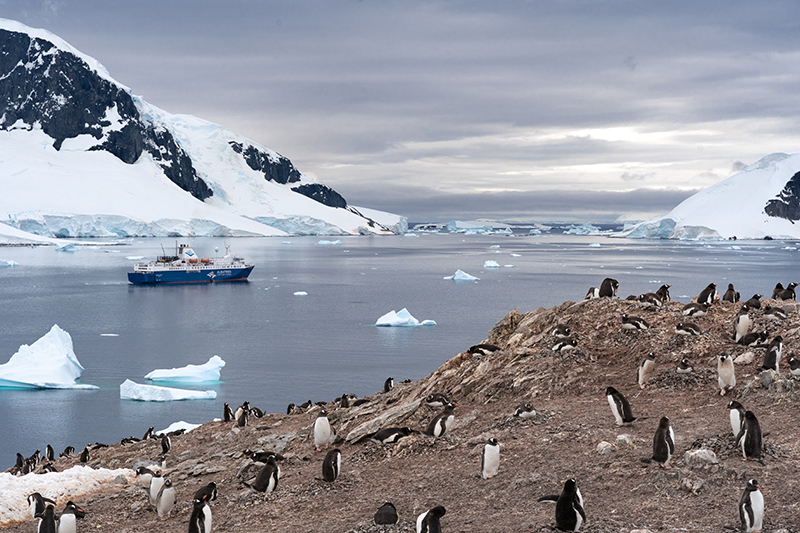The recent report Eyes wide open: Managing the Australia-China Antarctic relationship by Anthony Bergin and Tony Cross falls into the category of ‘if China’s doing it, its malevolent’.

The segue by The Age to this report in a recent article gave the impression it was perhaps far more weighty than it is. By its association with the possibility of a new ruction in Australian-Chinese relations, one that threatens ‘a Chinese boycott’ of Australian goods and services, The Age article uncritically gave the Eyes wide open report more weight than it deserves.
The claim by Bergin and Cross that ‘Beijing was pushing its interests beyond the South China Sea and was now targeting geo-political ambitions in Antarctica’ is an exaggeration. The report also does not substantiate the claim that in Antarctica, ‘China is ‘moving rapidly on a broad front, as it has done in the South China Sea’. The analogy between China’s defensive military actions in the South China Sea and its pursuit of scientific cooperation on the Southern continent is strained.
The contexts of Antarctica and the South China Sea are not comparable. The suggestion is unfounded that China’s ‘activities in the South China Sea have demonstrated Beijing’s willingness to openly ignore international law when it identifies a compelling strategic reason to do so’. The connection between Chinese security policy in the South China Sea and activities in Antarctica requires justification.
In East Asia, China faces a formidable array of, if not hostile, certainly adversarial forces. China’s east coast contains the bulk of its population, and industrial and military infrastructure. Therefore, its security interests in the South China Sea are substantial and strategic, if not existential. China’s interests in the Antarctic are in no way comparable.
The report uses words and phrases that substitute for clear explication of concepts. ‘Australia’s strategic interests’ is such a phrase, as is ‘geopolitical complexities in Antarctica’. They are effectively shorthand routes to elevating the importance of the issue in the reader’s mind without having to argue the point. The recourse to phrases that amount to vague calls on unnamed authorities, like ‘[F]or some analysts’, ‘[I]t’s sometimes suggested’ and ‘[S]ome academics suggest’, is a similar attempt to lend respectability to the report’s speculations.
The difficulties created by China’s increasing interest and presence in Antarctica are real, but not obviously part of the supposed global dominance plan of President Xi. Nonetheless, while China’s investment in infrastructure and its scientific activities do not seem disproportionate to its size, China’s longer term interest in mineral resources and fisheries will need to be monitored and managed, as the report suggests.
The report is, however, tarnished by its attempts link every Chinese activity to an overarching plan for world domination, and by the language employed. China doesn’t simply have differences with other members of the Antarctic Treaty System, in the words of the report, it attacks stability ‘through corrosion and changes in the values and norms of the system’.
The report also evinces a peculiar tendency among some Australian commentators to assume that most other nations perceive the Chinese through the same conspiratorial template. The report takes as a given that other states share the US compliant adversarial view of China, and would be prepared to join with Australia in forming anti-Chinese coalitions, including over the Antarctic. There is no evidence of this.
Australia should, it recommends, ‘work closely with natural groupings in the Antarctic Treaty System, such as the claimant states, the original signatories, the Five Eyes, the Southern Hemisphere states and the Antarctic gateway states, and other like-minded states and groupings’. While most nations are cautious, prudent and alert in their dealings with China, few nations obsess as much as the report does over interpreting every Chinese act as being driven by malign intentions.
To be clear, it would be silly to deny that China doesn’t see that it has interests in Antarctica. As a great power it has long term interests in access to resources wherever they are, as its far more geo-strategically important activities in the Arctic have shown.
Those interests range from exclusive use of resources when possible, to shared access when practicable, and to control and denial when strategically important. A pattern of behaviour that great powers like the British Empire, the Soviet Union and the United States all exhibited before China. As an advanced technological state they also have a deep interest in science, both as basic research for its own sake and for its potential to bolster China’s economy and security. Interests that, even as the report makes clear, China is legally and peacefully pursuing in Antarctica.
It would be nice if commentators like Bergin and Cross could see Australia’s interests as clearly as the Chinese see theirs. The Eyes Wide Open recommendations comprise a disproportionate reaction to a manufactured crisis regarding China’s presence and activities in Antarctica. The report’s worst aspect is that the need for Australia to confront and resist China on any and all fronts all the time is assumed.
The report does contain a lot of information about China’s activities in Antarctica and sets out aspects of the Chinese-Australian relationship. On that level it is of interest. However, by approaching everything China does anywhere, including in Antarctica, as malign simply leads to unbalanced policy and a misinformed public.
Mike Scrafton was a Deputy Secretary in the Victorian Department of Sustainability and Environment, senior Defence executive, CEO of a state statutory body, and chief of staff and ministerial adviser to the minister for defence.

Comments
7 responses to “MIKE SCRAFTON. A blinkered view: China in the Antarctic”
It would be good to get Anne-Marie Brady’s view on the Eyes Wide Open report and Mike Scrafton’s subsequent analysis.
Scientists from different countries working in Antarctica are always happy to see each other. The main reason is that we share scientific curiosity about the strange and fascinating environment. Each of us loves to know where the others have been and what they found there. Another reason is that remoteness in a hostile environment means danger when things go wrong, and we look on each other as potential rescuers.
Books like the one reviewed reflect the contingencies of survival back home in the declining West. Life is different down south, or for that matter, in science, which is not declining.
Thanks for bringing this error to my attention Harvey. The report’s co-author is of course Dr Tony Press, the recognised Antarctic expert, and I had no one else in mind.
Thank you Harvey. I have not read the report and I am inclined to support Mike Scrafton’s comments that confusing activities in the South China Sea with those in Antarctica is untenable. I know Tony Cross and would not believe that he would be responsible for such an assertation
Bob, please read the Bergin and PRESS report before passing judgment. It seems to me that there is so much commentary swirling around about Australian/Chinese relations these days it is difficult to get the clear view we so desperately need.
“However, by approaching everything China does anywhere, including in Antarctica, as malign simply leads to unbalanced policy and a misinformed public.”
You summed it up so well and appropriately.
But I am even more concern that the current tsunami wave of anti-China media commentators and politicians not just misinformed the public but misled the Australian Governments’ policies toward China which have served us well last 40 years.
They are cooking up discords again on the problems facing our beef and barley exports to China. Australian Government should try to negotiate with China in a respectful way and help to solve the technical problems facing our export industry!
The co-author of “Eyes wide open: Managing the Australia-China Antarctic relationship is Tony Press, not Tony Cross.